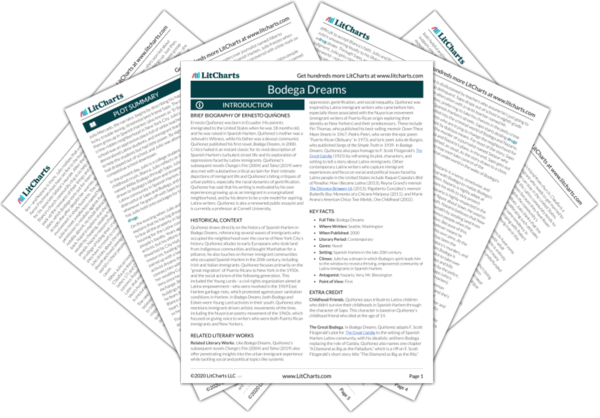Leveraging the voice of young narrator Julio, author Ernesto Quiñonez offers a harsh critique of religion as a largely disempowering force in the Latinx community in Bodega Dreams. Julio argues that his devout wife, Blanca, chides him for his sexism yet endorses the Bible, which depicts women as mere afterthoughts to the activities of men. Julio also thinks that the sermons at Blanca’s church depict women as promiscuous and sinful, and that their chief purposes in life are to procreate and to blindly adore men. Julio’s other qualm with the church is that it encourages people to tolerate their poor living conditions and wait for salvation instead of taking steps to empower themselves, which only reinforces their poverty. Using Julio as a mouthpiece, Quiñonez argues that even though there’s an admirable sense of community among the churchgoing residents of Spanish Harlem, many of the messages that religion peddles ultimately damage, rather than improve, the welfare of the Latinx community.
Julio argues that religion is sexist because the Bible depicts men as people who make decisions without consulting their wives, and the sermons at Blanca’s church reinforce the perception of women as promiscuous sinners whose salvation depends upon men. Julio argues that the Bible is sexist because he “read that entire Bible and rarely did any of the men tell their wives what they were going to do, they just went and did it.” Julio also thinks the sermons at Blanca’s church disempower women by depicting them as sexually immoral people who serve little purpose beyond getting pregnant and glorifying the men who offer them salvation. Julio argues that Blanca’s education is a more positive influence on her than her church, because when she graduates college while pregnant, people will applaud her efforts despite her pregnancy—yet in her church, people only praise Blanca’s pregnancy, as if her education is irrelevant to her purpose in life. Quiñonez also emphasizes the sexism underpinning the sermons in Blanca’s church. In one sermon, the speaker (a teenager named Roberto Vega who’s getting anointed) comically describes women as wayward harlots who dabble in prostitution every time there isn’t a man around to save them. Roberto’s enthusiastic proclamations of “A whore! A prostitute!” are met with joyous cries of “Alleluia!” from the swooning women in the congregation who completely buy into his sexist overtones, much to Julio’s amusement. Julio also thinks it’s odd that the church community discounts Blanca’s religious devotion because of his own atheism, as if her moral value as a woman hinges on her husband’s behavior rather than her own.
Moreover, Julio argues that the churchgoing community of Spanish Harlem tolerate their poverty because they think the Lord will provide them with riches in the afterlife, meaning they wait in squalor for salvation instead of taking steps to better their situations themselves. Julio reflects that people in the church’s congregation believe religion will empower them, but all he sees are marginalized people living in slums when he reflects that “you wouldn’t catch Christ, in the flesh, living in the projects.” Julio argues that religious devotion is actually disempowering, because churchgoing people live in squalor among “rats and roaches” while waiting for the afterlife instead of pushing for social change. Overall, Quiñonez depicts religious devotion as both absurd and dangerous.
To Quiñonez, the church effectively legitimates and reinforces—rather than eradicates—two elements of life in the Latinx community that are fundamentally disempowering: machismo and poverty. Through Julio’s reflections, Quiñonez ultimately implies that education and social activism are more productive than religious devotion for empowering Latinx people.
Religion, Sexism, and Poverty ThemeTracker

Religion, Sexism, and Poverty Quotes in Bodega Dreams
“When you complain that you’re gonna feel awkward graduating with a big belly, I know what you really mean. You mean people are gonna think, ‘She may be smart, but she was stupid enough to get herself knocked up.’ But when you go to church it all changes. They like you pregnant and you like them to like you pregnant.”

Unlock explanations and citation info for this and every other Bodega Dreams quote.
Plus so much more...
Get LitCharts A+“Blanca, why does me becoming Pentecostal have any bearing on you getting your privileges back? On you playing the tambourine in front of the congregation? Why do they look at me and my faults and not you and your merits?”
“And he loved her. And she, and she—don’t tell me you don’t know what she did. Don't tell me you don’t know that she later left to fornicate with other kings. Don’t tell me you don’t know that she left her king and went with others, and don't tell me you don’t know this princess was called Israel. And she went with other gods and slept with many idols. You still don't know what she did? […] I’ll tell you what she became. You all know what she became, don't tell me you all don't know what she became. She became a harlot! […] A whore! […] A prostitute!”
They had seen the coming of the Lord. He was coming soon, maybe even that very night. Roberto Vega had told them so. The kingdom of God would arrive, and they would all go to heaven, to the penthouse in the sky. Until then, they would go back home to the rats and roaches.
He was the Lord’s stud, wanted by sisters in Christ who all hoped to be his chosen.
“For a Latina that’s not married, twenty-seven is ancient. Nobody is going to want to marry her.”











